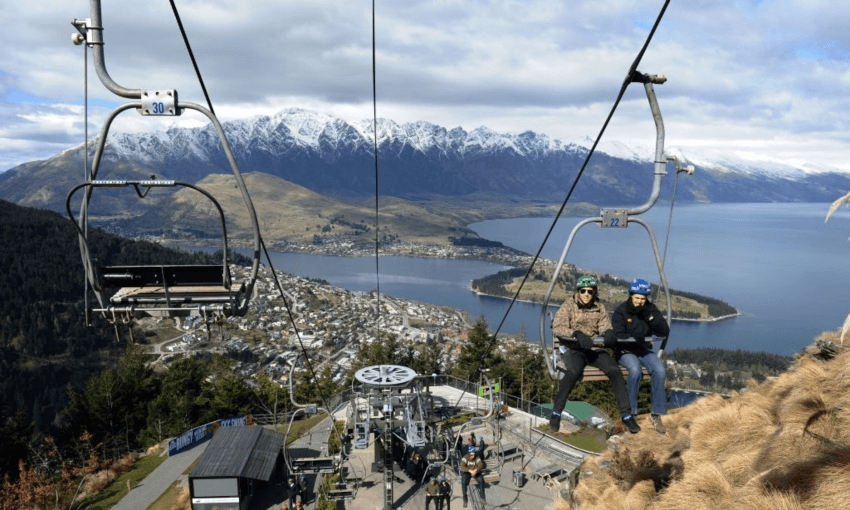The Parliamentary Commissioner for the Environment’s report is very clear – our tourism industry is contributing to serious environmental degradation in its current form. So what does that mean?
What’s all this then?
Tourism in this country has a huge problem. It is heavily dependent on the image of New Zealand as clean and green. And it’s a hugely important industry for the wider economy – depending on the measurement you use, it could be considered the most important source of export income in the country. But at the same time, the growth in tourist numbers is having a serious effect on the environment that it relies on, in all sorts of troubling ways.
Who says?
The Parliamentary Commission for the Environment, in a new report released today. That’s an independent office that assesses difficult problems, ponders them for a while, and then drops an uncomfortable truth bomb on the country.
Commissioner Simon Upton has made something of a habit of this, and says about the latest report that “tourism is often seen as an environmentally benign form of economic development. This, together with it being so closely interwoven with the wider economy, has probably shielded it from the scrutiny attached to other industries such as agriculture.” That scrutiny has now been applied, with the report looking at the industry as it currently exists, and projecting forward thirty years to what the effects will be if a ‘business as usual’ approach is followed.
I’m guessing it won’t be enjoyable to read what that scrutiny has uncovered.
Absolutely not. The report notes that currently about 4 million visitors arrive each year, and that number is growing. But with those immense numbers come increasing problems. The report groups those into six main areas:
• visitor density and loss of natural quiet
• water quality degradation
• solid waste generation and management
• infrastructure development and landscape modification
• biodiversity loss and biosecurity risk
• greenhouse gas emissions.
Can’t we just use carbon offsetting for that last one?
To a small degree, yes. But at present, we just don’t. A vanishingly tiny proportion of Air New Zealand flyers currently choose to pay a bit extra to offset their emissions, and there’s no indication that the airline will make it a compulsory charge any time soon. Offsetting brings with it a whole lot of other problems in any case, such as the need to convert huge swathes of land into forestry. As pro-farmer groups like 50 Shades of Green have pointed out, it’s kind of ridiculous to convert productive farmland into pine forests so that tourists can come to New Zealand and see…. pine forests.
Should I stop flying? Should we stop people flying here?
The PCE report is very clear that it is not calling on people to stop flying. However, speaking as a human being, yeah, you probably should be a lot more conscientious about how, when and why you fly. The idea that flying can ever be sustainable in a meaningful way is basically bullshit – what do you think jet fuel is made of? No amount of newspapers being removed from the Koru Lounge or edible teacups on a plane will change that simple fact. That’s not in and of itself a reason to never fly again, but it is absolutely a reason to be a lot more selective about when and why you do. Remember, New Zealand is a hell of a long way from the rest of the world.
So, lots of problems then. Any solutions?
The PCE report is also very clear that no, they aren’t necessarily providing solutions in this document.
Okay what about this: No more flying, we get people here by boat instead.
Yeah, that has issues too. AUT professor Michael Lueck notes that a big impact could be made by allowing fewer cruise ships into our waters. “These put a disproportional burden on New Zealand’s infrastructure, environment, and culture, while the economic benefits are comparatively small.”
How about this then: we get much fewer tourists in, but with much higher value attached to each individual?
That would bring down flight emissions, yes. But it wouldn’t address other concerns highlighted in the document, for example the generation of waste. From the report’s FAQ’s: “A more luxurious level of accommodation can often mean more solid waste generation. There is little evidence that higher-spending visitors create any less environmental pressure than their lower spending peers.”
We can’t just stop tourism though – the economy of huge swathes of the country would absolutely tank.
Yes, and that’s what makes this such a horrible problem. In the overview to the report, Upton recounts how parts of the country were encouraged to maintain their naturally beautiful areas like old growth forests, rather than extract resources from them. “Towns like Fox and Franz are cameos of the way in which tourism has become a plug-in replacement industry in many parts of New Zealand. We are selling an encounter with a stunning physical environment and a raft of services to our visitors. And the quality of the coffee has never been better.” But he also notes that “in selling access to these experiences, tourism risks becoming an extractive industry in its own right.”
What are the experts saying?
Professor Regina Scheyvens from Massey University said “a business-as-usual approach to growing our tourism sector will have devastating consequences for the natural environment which is the major drawcard for our tourists.”
She added that “the report, quite rightly, notes that in contrast to the ‘win-win-win’ rhetoric promulgated by the sector (i.e. that we can grow tourism numbers, and provide quality jobs, and protect the environment), trade-offs will need to be made – however trading on the integrity and wellbeing of our natural environment should not be an option.”
She also suggests an end to one of the things that people love so much about tourism in New Zealand – that heaps of the really cool stuff to see is entirely free. “For example, charging $20 per adult during the peak season and putting a cap on total numbers per day to do popular walks like the Tongariro Crossing or Roy’s Peak could help to control the impact.”
Professor Michael Hall argues we need much better systems to measure and control the impacts of tourism, saying “we don’t have a good set of indicators to measure the environmental and cultural impact of tourism, and there is an over-reliance on self-regulation.”
And Professor Lueck says it “is clear that tourism cannot grow at the pace it currently does, and that New Zealand must urgently find ways to curb this growth.”
The big question then. Is the tourism industry fucked?
No, it’s not. But we need to stop pretending that it’s an environmentally benign form of economic growth. And there’s a scary warning at the end of it all, about whether in a warming world we’ll be able to rely on tourism. “Simply put, tourism can impact the environment, but changes in the environment can also impact tourism.”
Related:
‘The entirety of New Zealand is a national park’: the case for implementing a border fee





